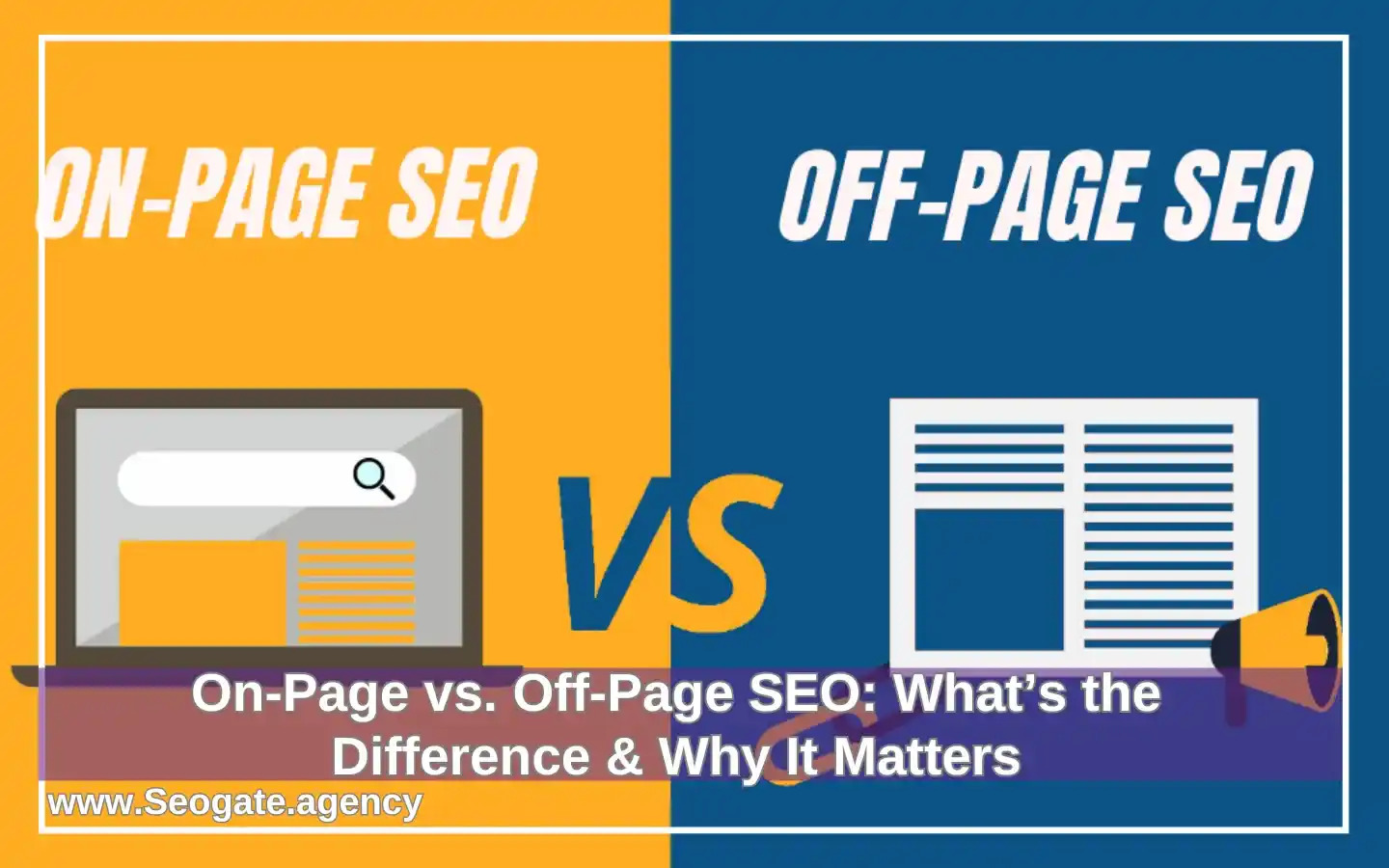On-Page vs. Off-Page SEO: What’s the Difference & Why It Matters
Learn the key differences between On-Page and Off-Page SEO and why both are essential for improving search rankings and online visibility.

 SeoGate Team
10
Min
SeoGate Team
10
Min
 2025 March
2025 March
What is On-Page SEO?
On-Page SEO refers to the optimizations you perform on your site to improve its ranking on search engine results. These optimizations involve content, structure, and other elements on your site that search engines take into account to rank your site for specific search queries. By focusing on on-page elements, you make sure that your site is well optimized for both search engines and users, which can result in more organic traffic.
Primary On-Page SEO Aspects
Primary On-Page SEO Aspects
Keyword Optimization
Correct keyword optimization is the foundation of on-page SEO. In order to rank higher in search, you need to find the correct keywords for your content and naturally incorporate them into your webpage.
Content Quality and Length
Content is king as much as on-page SEO is concerned. Useful, valuable, and content that is directly pertinent ranks higher.
Internal Linking
Internal linking is the process of linking other pages on your site. They help search engines crawl and index your content, as well as improve the user experience by giving them the ability to navigate your website more effectively.
Mobile Optimization
As mobile traffic is the most prominent source of site visits, mobile optimization has an important role to play in on-page SEO.
Page Load Speed
Page loading is also an important ranking signal within the Google algorithm. Optimize images, use caching techniques, and minimize scripts so your pages are quick to load on any device.
User Experience (UX)
Navigation, interactive features, and layout on your website can influence how users behave on your website.
What is Off-Page SEO?
Off-Page SEO, however, consists of actions taken outside your site to rank your site higher with search engines. It is about marketing your site everywhere on the internet to establish authority, credibility, and trust.
Key Off-Page SEO Elements
Backlinks
Backlinks are among the most important off-page SEO factors. They act as "votes of confidence" and enhance a website’s credibility.
Social Signals
Social media engagement (likes, shares, and comments) indirectly influences off-page SEO.
Brand Mentions
Google recognizes brand mentions as a ranking signal, even if they do not contain direct backlinks.
Influencer Marketing
Collaborating with influencers can improve brand visibility, increase traffic, and help in gaining backlinks.
Local SEO and Citations
For locally focused businesses, local SEO is essential. Consistency across all citations establishes trust with search engines and fosters local rankings.
Primary Differences Between On-Page and Off-Page SEO
1. Area of Focus
On-Page SEO focuses on content and structure within your website.
Off-Page SEO is about promoting your site externally through backlinks, brand signals, and authority-building efforts.
2. Control
On-Page SEO is completely in your control since it involves optimizing your own content.
Off-Page SEO depends on external factors, such as other websites linking to you.
3. Time to Results
On-Page SEO takes longer to show results but builds sustainable rankings.
Off-Page SEO can generate quicker boosts in rankings if backlinks or social engagement increase rapidly.
4. Impact on Rankings
On-Page SEO ensures search engines can properly understand and rank your content.
Off-Page SEO establishes credibility and domain authority, making rankings more stable.
Why Both On-Page and Off-Page SEO Matter
Both methods are essential for a well-rounded SEO strategy.
On-Page SEO helps search engines index and rank your content properly.
Off-Page SEO builds trust and credibility, which strengthens your rankings.
Together, they ensure your website performs well in search engines and attracts organic traffic.
On-page and off-page SEO are the two inseparable components of a successful SEO plan. On-page SEO addresses the optimization of the components of your website to render it search-engine-friendly, while off-page SEO attempts to establish the authority and credibility of your site through means outside of it. By understanding the difference between these two techniques along with optimizing them both to their limit, you are able to boost your search engine rankings, bring more organic traffic, and have a greater online presence for your business. Within the ever-changing world of SEO, achieving a balance between both on-page and off-page techniques is the key to long-term success within the online world.